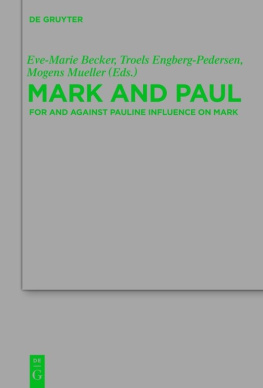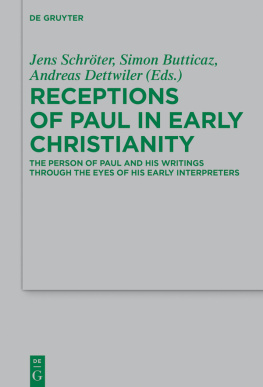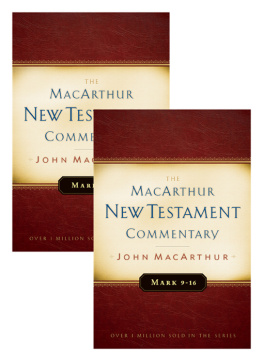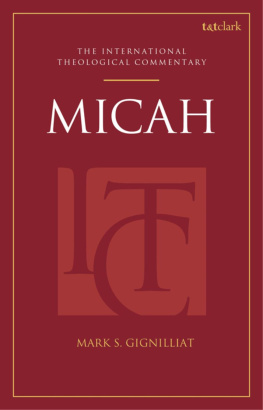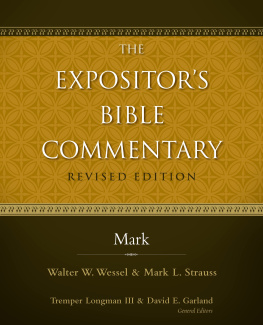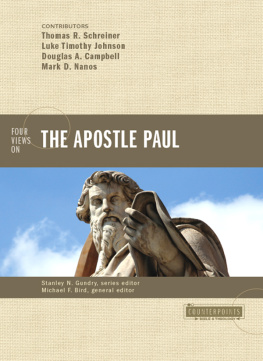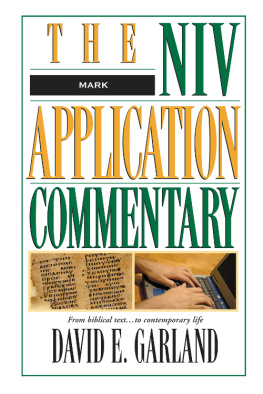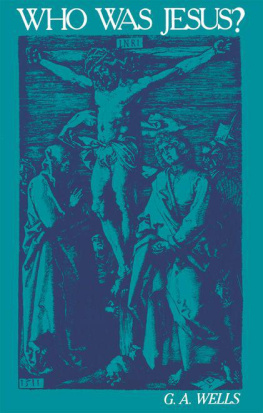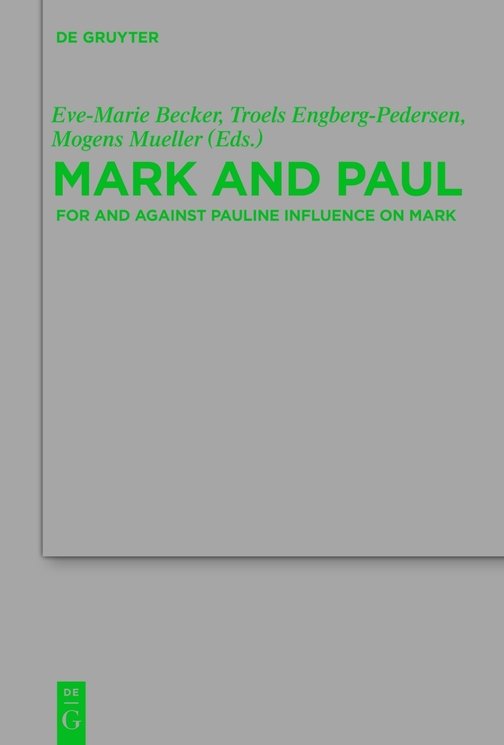List of Contributors
Eve-Marie Becker is Professor for New Testament exegesis at Aarhus University
Gitte Buch-Hansen is Professor at the University of Copenhagen
Finn Damgaard is a Post Doctoral student at the University of Copenhagen
Ole Davidsen is Associate Professor at Aarhus University
Jan Dochhorn is Associate Professor at Aarhus University
Troels Engberg-Pedersen is Professor of the New Testament at the University of Copenhagen
Kasper Bro Larsen is Associate Professor at Aarhus University
Joel Marcus is Professor of New Testament and Christian Origins at Duke University
Mogens Mller is Professor of the New Testament at the University of Copenhagen
Jesper Tang Nielsen is Professor at the University of Copenhagen
Heike Omerzu is Professor at the University of Copenhagen
Anne Vig Skoven () was a Ph.D. student at the University of Copenhagen
Gerd Theissen is Professor em. at Heidelberg University
Oda Wischmeyer is Professor em. at the University of Erlangen-Nuremberg.
Anne Vig Skoven
Mark as Allegorical Rewriting of Paul: Gustav Volkmars Understanding of the Gospel of Mark
Ganz geschichtlich und ganz Posie,
Beides in Einem
(Gustav Volkmar, 1857)
Introduction: The beginning of the Mark/Paul-connection in the scholarly debate
Baur argued that Mark was based on Matthew and Luke and composed in the 2nd century. According to the Tbingen School, the Gospel of John was the final synthesis of the antitheses between Jewish Christian orthodoxy and the Pauline spirit and Mark was one step on that way.
In 1857, the German exegete Gustav Hermann Joseph Philipp Volkmar (1809 93) characterized the Gospel of Mark as a Pauline gospel. Although Marks story was concerned with Jesus life and death, it was also, so Volkmar argued, permeated by Pauline theology. During his lifetime, Volkmar remained a solitary figure, and David Friedrich Strauss (18081874) once considered him a nrriger Kauz. Nevertheless, at the end of the 19th century knowledge of Volkmars thesis and writings was widespread among German speaking scholars. His thesis drove a wedge into German biblical scholarship; Adolf Jlicher (18571938) and William Wrede (18591906) both appreciated Volkmars work, Albert Schweizer (18751965) and his student Martin Werner (18871964) did not.
Since Gustav Volkmar is rather unknown to contemporary biblical scholarship, I shall here provide a short biography.
- Die Religion Jesu und ihre erste Entwickelung nach dem gegenwrtigen Stande der Wissenschaft (Leipzig: F. A. Brockhaus, 1857); a popular work, which introduced Volkmars thesis of Mark as a Pauline gospel.
- Die Evangelien, oder Marcus und die Synopsis der kanonischen und ausserkanonischen Evangelien nach dem ltesten Text mit historisch-exegetischem Commentar (Leipzig: Ludw. Fr. Fues Verlag, 1870); a scholarly commentary on the Gospel of Mark, in which Volkmar, against Baur, forwarded his thesis that Mark was the first gospel, Luke the second and Matthew only the third. The commentary was republished in a slightly edited second edition with a new title in:
- Marcus und die Synopse der Evangelien nach dem urkundlichen Text und das Geschichtliche vom Leben Jesu (Zrich: Verlag von Caesar Schmidt, 1876).
However, we must leave this volume from Volkmars hand aside for the present purpose.
In his biographical sketch of Gustav Volkmar from 1908, Adolf Jlicher characterizes Volkmar as an exegete whose work was framed to the one side by Baurs Tendenztheorie and to the other side by Strauss scepticism (772f). Yet, he differs from both schools on two important issues: historicity and Markan priority. With regard to Strauss, Volkmar welcomes his critique of the rationalistic and harmonizing exegesis of early 19th century scholarship. Yet, his understanding of historicity, as well as his method are closer to those of 20th century redaction criticism than to the Leben Jesu Forschung of his own century. With regard to the Tbingen School, Volkmar treats the early Christian literature as Tendenzschriften. His overall project was to reconstruct the history of the gospel traditions as a reflection of the developments in early Christianity. But unlike the Tbingen exegetes, he accepted, as already mentioned, the thesis of Markan priority. Consequently, he rejected the idea of an Ur-Evangelium which was needed for the Tbinger explanation of the gospel relations. Likewise he rejected the idea of a Spruchbuch or Schriftquelle (1870, viii-xi; 1876, 646) later identified as Q. According to Volkmar, Marks only sources were: the Old Testament writings, four Pauline letters (Romans, Galatians, 1 and 2 Corinthians), the oral tradition of early Christian communities and, surprisingly, Revelation.
In this essay, I shall offer a thorough presentation of Volkmars thesis about Paulinism in Mark. In the first part, I discuss the alleged relationship between Revelation and the Gospel of Mark. I also account for Volkmars considerations of the composition and genre of Mark. In the second part, I go into more detail concerning the relationship between Mark and Paul. Here I first provide a summary of the general thesis as set out in 1857, which reflects Volkmars view of the Markan Jesus. Next, I give an example from his 1870/76 commentary on Mark, which demonstrates the literary character of the relationship between the Jesus traditions and the Pauline gospel in the Markan text. In the third part, I return to the reception of Volkmars work among his contemporary colleagues and elaborate on the criticism to which his work was exposed around the fin de sicle. Finally, I discuss the relevance of Volkmars thesis for 21st century New Testament studies.
1 Gustav Volkmars Understanding of the Gospel of Mark
Redating Mark
According to Volkmar, Revelation or the apocalypse of Jesus Christ as he calls it using the self-designation of the text (Rev 1:1) was the thesis towards which the Gospel of Mark was the antithesis and reaction (1876, 646). The apocalypse was, so Volkmar explains, the first narrative Christian text. It was written in 68 during the reign of Nero, presumably by John, the Zebedee son. It represented Jewish Christian orthodoxy and emphasized the exclusively future character of salvation which was to take place at the parousia. Within this worldview, there was no future and no salvation for the Gentiles. In contrast, the second narrative Christian writing, the Gospel of Mark, featured the (true) Pauline Christ who preached salvation for all, including the Gentiles (1876, 7 8).
Volkmar argues that Mark was written in the seventies, that is, a hundred years earlier than the Tbingen School presumed.Volkmar believes the author of Mark to be a Hebrew-thinking, Greek-speaking Jew, who had spent some time in Galilee and Jerusalem, and who was acquainted with the Pauline gospel as well as with early oral traditions (1876, 647). He thinks very highly of the author: er bleibt doch einer der geistvollsten und einflussreichsten Schriftsteller, die es nach Paulus gegeben hat (1876, 647).
Character composition genre
However, Marks successors changed the original gospel in a more prosaic direction (pro-sasieren). In the Gospel of Mark, Revelations apocalypticism and future parousia were transformed into a didactic narrative about the historical manifestations of the glory of the Pauline Christ: Die visionre Erzhlung von knftigen Parusie ist hier [in Markus] zu einer lehrbildlichen Erzhlung von der schon diesseitigen Herrlichkeit des Christus Pauli geworden (1876, 646, emphasis added). Marks Gospel had a distinctly doctrinal character which, from the very beginning, was polemically directed against Revelation. Consequently, his evangelion begins not with the parousia but with John the Baptist, who, as foretold by Isaiah, was to prepare the coming of the kingdom in history. The whole section in Mark 1:18 was a doctrinal discourse (Lehrvortrag) about the character of Johns baptism. On the one hand, it was a divinely ordered and necessary preparation for the salvation through Christ (1:14). On the other hand, it was not sufficient, which the Baptist himself confirms: I have baptized you with water, but he shall baptize you with Holy Spirit (Mark 1:7 8) (1876, 31).

